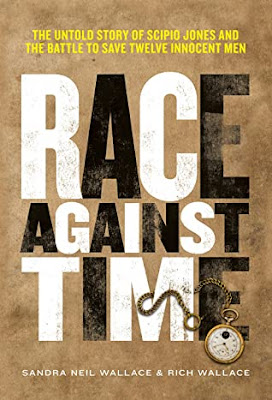RACE AGAINST TIME: The Untold Story of Scipio Jones and the Battle to Save Twelve Innocent Men by Sandra Neil Wallace and Rich Wallace is an account of one of those racists events which was swept-under-the-rug until now. In Elaine, Arkansas in 1919, Black sharecroppers, some who had just come home from fight in the Great War, were gathered in a building to organize a union to help secure fair prices for the cotton they'd grown. White plantation owners and a white mob, surrounded the building, shooting inward, which caused a stampede of people trying to save themselves. Eventually the whites burned down the building to destroy the evidence of the bullet holes. Four or five white men were killed and many blacks, probably over 100. When the event was over, twelve blacks were arrested, hastily tried, and sentenced to death for the "murders." These twelve men were innocent but were found guilty by a justice system not interested in justice.
When a black lawyer, Scipio Jones, learned of the men's plight he set to work to set them free. Along the way he wrote a legal brief that made it to the Supreme Court, the first written by a black lawyer considered by the highest court, and through dogged determination won the freedom of all twelve men. The authors, Sandra Neil Wallace and Rich Wallace, were doing research on that landmark case, Moore v. Demsey, when they uncovered this remarkable story of a self-taught, once enslaved attorney, Scipio Jones. They said about the decision to write his story, "One hundred years after the Elaine Massacre, we were surprised that no one had written a book for teenagers about Scipio Jones or the Elaine Twelve men." So they set out to correct the record, to let the world know about this amazing man and what he did for these twelve men and blacks into the future.
What I liked about the book:
- The book is one of those short books, 120+ pages, with illustrations and primary documents from newspapers and flyers of the day. It is very readable with a target audience on 12-15 years.
- I learned something new, not just about the Elaine Massacre and Scipio Jones but also how the landmark case helped pave the way for civil rights legislation into the future. Yet, there wasn't too much information to swamp the project or the reader.
- There s an excellent bibliography, author's notes, and photo credits, all useful tools for further research.
What I didn't like about the book:
- Nothing. I thought this book was great.
-Anne


This sounds really good and I especially like that it has illustrations and primary sources in it, which do well with students.
ReplyDeleteYes, since this is a Cybils nominated book, I think the sources are vital.
ReplyDeleteThis sounds fascinating, and yes, like a bit of history we all need to know and acknowledge.
ReplyDeleteThe ironic thing about this critical race theory controversy in politics is that NOT ONE school district in the entire nation has it on the curriculum - it is a subject only taught in grad schools ... yet hundreds of local politicians running for election made eliminating it from their schools part of their platform this fall. The level of ignorance is shocking and terrifying.
Sue
Admittedly, the definition of Critical Race Theory is confusing. But it is also clear that people aren't bothering to look into it. It has become, inaccurately, a wedge issue. Sigh.
DeleteThis sounds like a vital book and I'm glad it's been written.
ReplyDelete